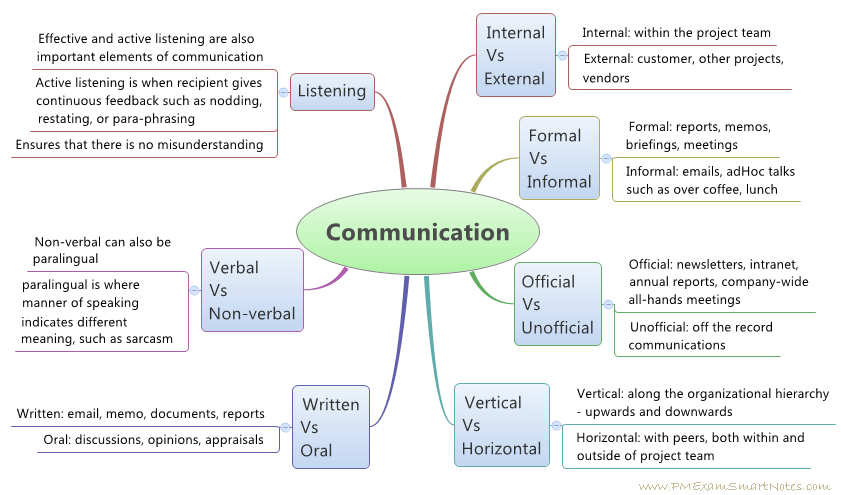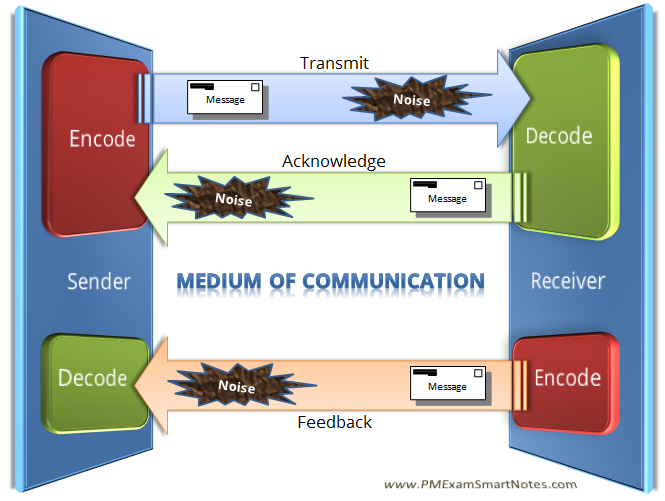 Oxford dictionary defines communication as “imparting or exchanging of information by speaking, writing or some other medium.”
Oxford dictionary defines communication as “imparting or exchanging of information by speaking, writing or some other medium.”
While it sounds simple, effective communication in project management is pretty big a challenge. Being able to communicate your thoughts in a way that the other person understands in the same way as you intended – is a hard thing.
Why?
Because when two people talk many aspects of communication come into play – choice of words, framing of sentences, tone, pitch, pauses, eye contact, body language, hand gestures – variation of each of these can give an entirely different meaning to what was said.
No wonder then that many project managers consider communication as a major reason for IT project failures!.
Let us look at the types of communication in a project setup
How does communication happen?
► Communication gets initiated from a sender, who encodes the message and sends it to the receiver over a medium of communication.
► Receiver decodes the information and processes it.
► However the noise in the medium may render the message useless to the receiver. This is similar to the disturbance in telephone line connection, which makes it harder to hear the person on the other end.
► Assuming that the noise did not ruin the message, Receiver encodes feedback and sends back to the sender.
► Sender gets the feedback and if noise has not rendered it useless, will decode and understand it.
What are the main components of communication?
- Sender: anyone or anything that initiates the message
- Receiver: anyone or anything that receives the message
- Message: piece of information
- Medium: a means by which message is transmitted between sender and receiver
- Acknowledgement: confirmation of receipt of message by receiver, sent back to sender
- Feedback: response to the message from receiver
- Noise: anything that interferes with the transmission of message or acknowledgement. For instance, distance, unfamiliar technology, lack of background information or language.
A basic communication model showing flow of information
Let us take a quick look at an example.
Jake met John at coffee break and asked for the design documents to be sent over. John confirmed that he would send it by the end of the day. At 9pm Jake got the mail with PDF version of the document. He tried to open it at 11pm and got an error “Windows cannot open the file”. He shot back a curt reply because now he has to wait until morning to look at the design.
Identify the components of communication:
Sender: _______________
Receiver: _______________
Message: _______________
Medium: _______________
Noise: _______________
Feedback: _______________
…
…
…
Give it a shot before scrolling to the answer, it is quite simple..
…
…
…
Answers:
Sender: John
Receiver: Jake
Message: design document
Medium: email
Noise: Inability of Jake’s computer to open the document
Feedback: Jake’s email message back to John
What can happen when communication goes bad?
Communication is the key to success in anything in life. Be it personal life or professional, importance communication cannot be overstated.History is full of instances where major mishaps happened due to communication issues.
In 1977, at Tenerife in the Canary Islands, heavy accents and improper terminology among a Dutch KLM crew, an American Pan Am crew and a Spanish air traffic controller led to the worst aviation disaster in history, in which 583 passengers perished.
You can see that the cause here may be one or more of noise, encode and decode in the communication channel.
What is the difference between Effective communication and Efficient communication?
Imagine that today you are in a city on an official trip and you are returning home tomorrow morning. Your flight is at 7 in the morning and you plan to start from hotel at 5.30am. You ask the front desk for a wake-up call at 5am.
How would you like to be woken up?
A phone call to your room, at exactly 5am, I would imagine, since that is what you asked for.
This would be effective communication – giving the information at the right time and in the right format.
When the person calls in the morning, what would be your reaction if he tells you that you have a flight to catch, then reads out the morning news, explains the weather outside, and lists out who else is staying at the hotel?
You might just expect the person to say something like “Good morning. This is your 5am wakeup call”, then wait for your acknowledgement and hang up.
This would be efficient communication – giving only the information that is needed.
A good communications planning reaps rich dividends for the project manager. While Communication Management processes mentioned in PMBOK® help in discovering relevant information pieces, determining communication mediums, methods and mechanisms – there is one more core skill that helps a project manager.
And that is one of the three characteristics of an effective project manager, interpersonal skills – which determines how effectively communication will be managed on the project.
The good news is that with proper planning majority of communication issues can be avoided. Throw in effective monitoring mechanisms into the mix and you can be sure of having least amount of communication issues on the project.
What is the direct benefit of this?
People tend to be happy working on the project when they do not get unexpected, nasty surprises!
That is a big advantage for the project manager.





